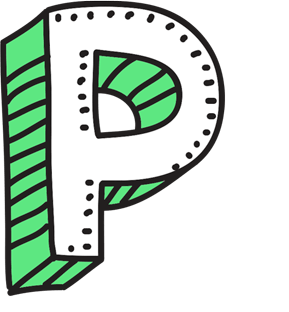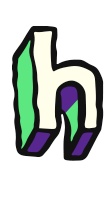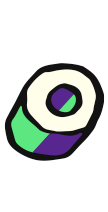You can search for anything linked to emotional well‑being in our handy A-Z guide.


-
Panic Attacks
Panic is a feeling or fear that everything is out of control / not going to be OK. Panic is both physical (increased heart rate, not being able to breathe, sweating, trembling, choking, heart pains) and emotional (total focus on the thing that is causing the fear).
A Panic Attack can come from nowhere or happen when something stressful is going to occur or is happening.
It can be a scary experience because it feels like a full on rush that won’t end and like it won’t be OK.
And the body releases all sorts of “fight or flight” hormones like when people are stressed. It usually ends after about 10-20 minutes.
What helps:
- Keeping calm and focusing on breathing slowly in through your nose and out through your mouth
- Focusing on the word calm
- Going to a quieter or more comfortable space with someone you trust
- Experience
Panic attacks can become easier to manage once you have had one because your experience tells you it will pass and you will be OK, and you have learned a little about how to handle it, but also the fear of having a panic attack can start one off.
For more information on panic attacks visit The Mix.
The Mix have also put together a useful guide to what to do if you are having a panic attack.
-
Paranoia
Paranoia is the feeling or suspicion or irrational thought that someone / or everyone is out to get you / is saying bad things, thinks terrible of you or is doing something else terrible. There’s nothing to back it up, but it’s very very real in a persons’ head and can be very scary. Paranoia can be a symptom of a mental health problem or illness, or a side effect of illegal, legal drugs or medication.
Paranoia can be a thought that someone or something is going to harm you physically (poisoning), emotionally (spreading rumours) or financially (stealing from you) or that someone is going to do something terrible (e.g. bomb a country)
A person with paranoia experiences these threats as very real and can therefore be scared, panicky and trying to do something to protect themselves or others.
Different things can cause paranoia including life experiences like being bullied or having a traumatic experience, being isolated in our communities, illness, lack of sleep, drugs and alcohol.
-
Peer Pressure
Peer pressure is the pressure people feel to either do (or not do) something or to be a certain way so that they get the approval of other people or just to stay included or safe. People of all ages are affected by it.
Peer pressure can come in different forms and can be positive or negative.
Because of peer pressure we can feel we have to do or say things we don’t want to or don’t agree with. This can at times mean we risk damage to our health or self-esteem, that we may do things we aren’t proud of or that we pretend to be someone we are not, and sometimes it means that we feel pressured into doing things that are harmful to other people, or that risks getting us into serious trouble.
On the other hand positive peer pressure can help us out – for example, if a group of friends decide to do something and then support each other to do it (e.g. setting up work-groups, stopping smoking, or trying to learn something together).
Peer pressure can be a real stress because nearly all of us feel a human need to be liked and to fit in with the people around us, and sometimes we know taking a stand might cause friendships to change, rejection, conflict, awkwardness or retaliation. There is however always the possibility that speaking up will make a positive change and get you respect.
If peer pressure is negative and becomes stressful or feels out of control it is vital that we take a step back and ask what we can do to change the situation.
As a young person you are responsible for your actions and many actions have consequences. It’s vital to learn how to say yes and no and mean it.
How to work out what to do
We could ask ourselves:
- Can I stand up to them and say I don’t like what is happening / don’t want to do something?
- Are other people in this group feeling the same way as me – are we all putting pressure on each other that none of us want?
- Am I willing to risk getting into trouble or hurting my own self esteem to fit in with these people?
- Do I want to fix this or do I want to move away from the group and make new friends?
- Who can I talk to to help me with this?
- Do I want my life to look like this? Is this who I am?
It can be a very positive experience to manage a difficult problem like this and realise we can take control but it can also be really scary, or seem impossible, especially if the stakes are high or if someone has low self-esteem and doesn’t really feel valued in the group.
Sometimes we all need help to decide what to do and how to do it – in this situation asking for help is the first step.
If you feel negative pressure from your friends then you can click on some of the links below to help you decide what to do.
At Childline you can find information about being assertive, dealing with peer pressure and read other young peoples' stories and experience and get their advice.
-
Personality Disorders
We all have different ways of thinking, feeling and behaving and have different qualities we develop these over time – we call this our personality and it is what drives how we get on with people and situations in the world around us.
Though personality disorders are quite common there is still some confusion about what they are.
In short: being diagnosed with a personality disorder means that a person does not have access to all the different feelings, attitudes and behaviours available to help them manage everyday life.
A person with a diagnosis of personality disorder might:
- find some situations very difficult to deal with especially when stressed
- live with stress, anxiety or depression
- be more likely to use harmful ways to cope with their feelings (like self-harm, avoiding contact with people, or using drugs and alcohol)
- be more likely to behave or respond in a way that seems odd to others.
- find it harder to keep and maintain relationships
- find it hard to behave in ways expected of them
- find it hard to learn to change their behaviours or feelings based on experience.
There are 10 different types of personality disorder and the signs can often appear in teenage years.
If you would like to find out more about personality disorders, including the signs and symptoms you can click to Young Minds.
Personality disorders are treatable and support is available through a GP or CAMHS team.
-
Pets
Having a pet can really help reduce anxiety and depression and help people feel more positive about themselves, less lonely and more calm. Pets are also great to talk to and share problems with – it can really help to practice expressing a problem to a pet before speaking with someone to seek help.
-
Phobia
A phobia is a specific type of anxiety or worry that is about a certain thing, person or experience. It is a fear that is very strong and can really harm a persons’ enjoyment of and ability to take part in life.
People can have a phobia of absolutely anything and where that phobia comes from is not always obvious.
Even when a person knows the thing isn’t a real risk this knowledge does not reduce the fear – sometimes even seeing a picture or a word can make people feel terrified.
People have phobias about of all sorts of things from inanimate objects, to animals to social situations.
There is a lot that can be done to cure phobias or help people manage them so they can enjoy life.
-
Porn and Mental Health
Porn is images or films of people having sex or doing sexual things. Some people enjoy watching porn and it's not illegal to watch it (so long as it doesn't show actual crime).
If under 18's (or adults) are made to view porn this can be sexual abuse or sexual bullying and this can be a very scary or confusing experience. If a child or young person sees porn they have done nothing wrong and it’s OK to talk about it.
Porn is a business so the purpose of it is to make money. The marketing people make money by getting as many people as possible to click onto their websites. They show more and more extreme images to try and get you to click through onto their pages. This means that what you see in porn isn't usually realistic – people might not look the same as the people you know and they may not be doing things that people you know would do. Lots of porn shows people being mistreated, unsafe sex, violent sexual acts and people being forced to do things they don't want to.
Although some people say they look at porn to learn about sex, as it doesn't show realistic sex, it maybe doesn't teach them things that are useful in real world relationships and can make them feel bad about themselves. Not all men have 12 inch penises and can have sex for hours, not all women shave their pubic hair and enjoy anal sex! Some people enjoy porn and see it as a positive part of their relationships but it can also have a negative impact on our views of men and women, on our own body image, our sexual relationships and the way we treat each other.
Lots of young people are concerned they might be addicted to porn, or have problems because of it. Childline made a series of films called the fight against porn zombies. You can see the series and get extra information about porn at Childline.
-
Post Natal Depression
Most new mothers get the “baby blues” after a baby is born, and young mums experience it more often than others. They might feel tearful, emotional, sad, or have other strong difficult feelings in the first week or so after giving birth. Some dads feel this too. For some people this doesn't go away, and for others a short time after the birth depression can kick in – this is called Post Natal Depression.
Having a new baby can be a real challenge, involving learning new skills, coping with reduced sleep, a massive change to daily life, and also managing the expectations of yourself and others about how they should act and how they should feel.
Essentially it can be a very difficult time which people have to face with all their physical and mental resources stretched to the max.
Post-natal depression is no-ones fault, it's often caused by chemicals and hormones in the body, but both the baby and parent deserve to be healthy, looked after and well. It's really important for a person with post-natal depression to talk / ask for help – it really can help and is a sign of strength and there's tons of things that can help.
-
Post-Traumatic Stress Disorder
Post-traumatic stress disorder is something that can happen to people after they experience, or see someone else experience a stressful or horrible event or events. It can happen even when a person can't remember the stressful event.
Having PTSD can mean people are in a constant state of anxiety and have a heightened awareness of everything going on. They may try and keep themselves busy to block out the event, avoid situations and events, have nightmares, flashbacks or panic attacks or not be able to sleep.
To find out more about PTSD and the help that is available please click to Young Minds.
-
Psychiatrist
A psychiatrist is a doctor specially trained to diagnose (identify) and treat mental illnesses and mental health problems.
-
Psychologist
Psychology is the scientific study of the mind and behaviour. A psychologist is a person who can apply or use this knowledge to help people.
-
Psychosis
Psychosis is the word used when someone loses touch with reality for a short or longer period of time. It can happen because of stress, an illness, drug use, or medical condition. A person might:
- believe things that aren't real (delusions)
- see things that aren’t real (hallucinations)
- have jumbled thoughts or behaviours
This can be a very frightening experience both for the person and can affect a person even when the psychosis has gone.
If you are concerned about psychosis it is really important to seek help asap – there are loads of things that can help.
You can find out more about psychosis at Headmeds.













If you still have unanswered questions, you can go to a service in your area for information & advice:



























